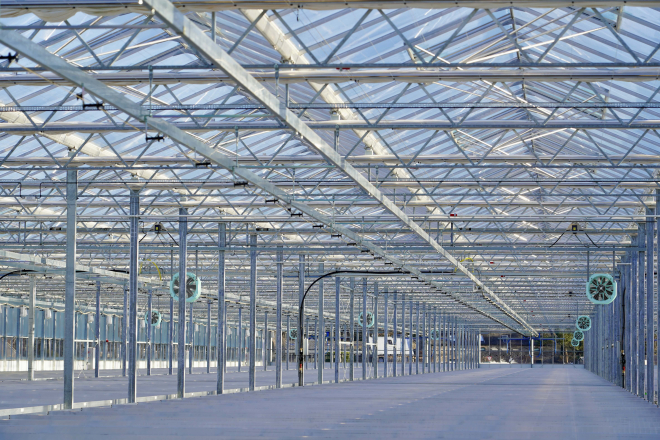In the glass house!

Forestry and Land Scotland (FLS) has taken the keys to its new glasshouse as part of the multimillion-pound redevelopment and modernisation project at Newton Nursery near Elgin.
The new state-of-the-art 12,000m2 glasshouse, which will be around the size of two football pitches and capable of growing up to 19 million trees per year under its roof. The investment in construction will enable FLS to more than double its tree production capacity and also includes new offices and a new distribution and operations centre.
FLS’s nursery team will now work to complete the fit out of the glasshouse along with the other operational buildings. Initial nursery operations will commence during 2025 with the site being fully operational by the end of the year.
The project – delivered in partnership with principal contractor Morgan Sindall Construction – and made possible with financial support from Scottish Government represents the biggest, single infrastructure investment ever by FLS.
Cabinet Secretary for Rural Affairs Mairi Gougeon said:
“This site handover marks a key milestone in FLS’ drive to become ‘fit for the future’. The modernisation of Newton Nursery - which includes technology to allow for the planting of one million tree seedlings in a single day - will help the organisation improve operational efficiency and flexibility.
“Growing trees from seed inside the glasshouse instead of outdoors in fields, will allow FLS to have much better control over the growing environment, meaning the seedlings are less vulnerable to damage from extreme weather events, herbivore browsing and competition from weeds.
“Once the redevelopment is complete, Newton could have up to 25 million trees growing on site in any one year, a significant increase from the seven million trees FLS are currently able to produce – and secure significant operational savings.”
The modern nursery will be a hub for innovation and will harness the benefits of cutting-edge technology such as mechanised tree planting and other process improvements to reduce manual labour inputs.
Energy and resource efficiency has been core to the redevelopment: local Scottish timber has been used in construction of the office building, boreholes will supply water to irrigate the seedlings so there will no new demand on the mains water system, and low energy use technologies have been incorporated into the building design, while solar panels will supplement electricity use.
Ian MacDonald, Senior Operations Manager at Morgan Sindall Construction, said:
"Thanks to the close collaborative partnership with Forestry and Land Scotland and the entire project team, we're thrilled to deliver innovative infrastructure that transforms tree production capacity in the area. By working closely with our project stakeholders and supply chain, we've leveraged modern methods of construction to create a facility that supports Scotland's environmental and economic objectives.
"We're very proud to have engaged local social enterprises and community groups throughout this project too, ensuring our construction approach delivers broader benefits beyond the physical build. The Newton Nursery development showcases Morgan Sindall Construction's commitment to collaborative, sustainable infrastructure that creates lasting value for both the environment and local communities."
FLS is the Scottish Government agency responsible for managing Scotland’s national forests and land and the trees grown at Newton Nursery will be planted out into forests all around Scotland as mature trees are felled. It will also enable the creation of new forests for the future. With the U.K. importing approximately 80% of its needs for wood products the timber from FLS forests helps the UK reduce its reliance on imported timber, reducing pressure on vulnerable forests around the world.
Ms Gougeon added:
“Planting and growing more young trees in Scotland will underpin FLS’ contribution to the Scottish Government’s ambitious target of net zero emissions by 2045. It will reduce the carbon footprint created from transport emissions and increase the number of trees we plant to absorb carbon dioxide, produce oxygen and end up as sustainable wood products.”
“The process of creating this supply of home-grown timber starts in Newton Nursery”
The stock produced within the glasshouse will be mostly conifer species such as lodgepole pine, Scots pine, Sitka and Norway spruce, which are the backbone of Scotland’s £1 billion forestry industry. The new facility also offers FLS the chance to grow a greater variety of tree species. This will provide greater diversity and build resilience in forests threatened by the impacts of disease and climate change events such as a rise in temperature, changes in rainfall and an increased frequency of wind and fire damage.
The new glasshouse will provide a protective and controlled environment to nurture seedlings. It is anticipated there will be a significant boost in germination success rate, with the aim to achieve an impressive 80% germination rate for seeds.


